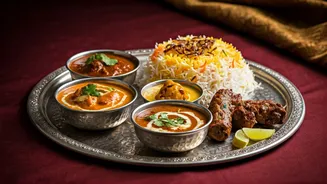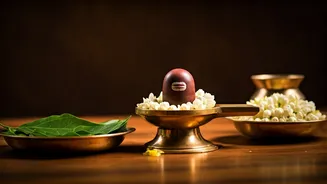The Nawabi Legacy
Lucknow's food scene is deeply rooted in the era of the Nawabs, whose patronage shaped the city's culinary identity. The Nawabs were not just rulers but
also connoisseurs of fine dining. Their love for food led to the development of sophisticated cooking techniques and the creation of elaborate dishes. The royal kitchens, or 'bawarchikhanas,' were hubs of innovation, where chefs experimented with ingredients and methods to create exquisite flavors. The influence of Persian, Mughal, and Central Asian cuisines is evident in Lucknawi dishes, resulting in a unique blend of tastes. The focus was not only on taste but also on presentation, with food being served in elegant settings. This royal heritage continues to define the Lucknawi food culture, where hospitality and a love for food are central to everyday life. The legacy of the Nawabs lives on, ensuring that the city's culinary traditions are preserved and celebrated.
Iconic Dishes Unveiled
Lucknow's culinary offerings are incredibly diverse, with several dishes standing out as iconic. The most famous is the 'Galouti Kebab,' known for its melt-in-your-mouth texture. This kebab was specially created for the Nawab, who, due to his age, couldn't chew tough meat. Another must-try is the 'Biryani,' a fragrant rice and meat dish prepared using a slow-cooking method. The city also has delectable 'Nihari,' a slow-cooked meat stew, and a variety of 'Kormas' (meat cooked in a thick gravy). Lucknow's food isn't just about non-vegetarian dishes. There is also a variety of vegetarian options, such as 'Paneer Masala,' and 'Dal Makhani.' Desserts like 'Shahi Tukda' (fried bread soaked in syrup) and 'Kulfi Faluda' provide the perfect sweet ending to any meal. These dishes showcase the city's rich culinary traditions.
Culinary Influences Explored
The flavors of Lucknow are a result of various influences that have shaped its culinary landscape over centuries. Persian and Mughal influences are clearly visible. Techniques such as slow cooking and the use of aromatic spices, like saffron and cardamom, are common. Central Asian flavors are also present, reflecting the historical migration patterns. Another significant influence on Lucknawi food is the concept of 'dum,' a cooking method where food is cooked in a sealed pot. This technique helps retain flavors and moisture, resulting in tender and flavorful dishes. The use of ingredients, like nuts, dried fruits, and rose water, adds a touch of sophistication to various dishes. Over time, the local cooks have adapted these influences, creating a unique style. The result is a vibrant cuisine that remains popular both in India and around the world, making Lucknow a must-visit destination for food lovers.
A City of Flavors
Lucknow's food scene goes beyond just individual dishes; it's about a complete cultural experience. The markets and food streets, like Chowk and Aminabad, are full of culinary treasures. These areas are a hub of activity, with stalls and restaurants offering a wide variety of dishes. Many eateries have been run by the same families for generations, and they've perfected recipes and cooking methods. Visiting these places provides a glimpse into the city's heritage. The hospitality is just as important as the food. Customers are always welcome, and the staff treats everyone like honored guests. The city's food culture blends different elements, reflecting Lucknow's history and its people's passion for food. This combination ensures that Lucknawi cuisine remains one of India's most cherished culinary traditions.




















